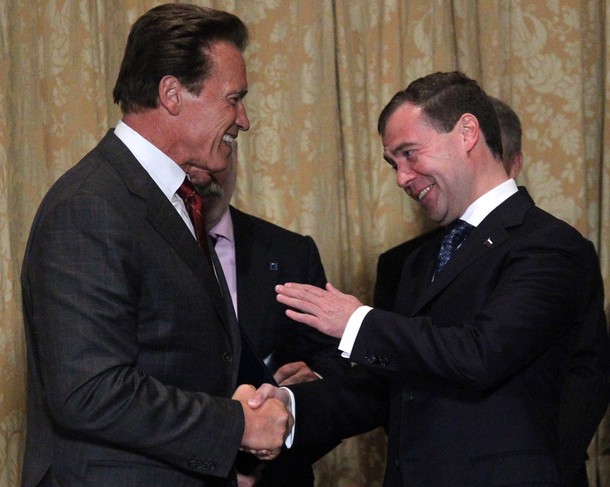
Don’t look now, but Russian President Dimitry Medvedev’s visits this week to Silicon Valley and Washington appear part of a wider Russian rethinking of its predicament. The operative word is thinking.
That Medvedev would like to create a Russian Silicon Valley suggests a belated realization that Russia, the Petro-state, is not a recipe for a bright future.
I wouldn’t bet the mortgage on his chances of success. This is not the first time that Medvedev lamented the Soprano-like state of which he is president and nor the first time he has expressed interest in reform and modernization. But the renewed interest in foreign investment as a catalyst for modernization is one of a number of intriguing developments that point to something of a shift – if not a reset – of the Russian way of doing business.
Signs of Change?
First there was the Putin shift on history, acknowledging the Katyn Forest horror in Poland, despite the tragic plane crash that disrupted the event. Then there was a sea border agreement with Norway in late April (hint: it was not Norway that changed its position). Then there was the Russian Foreign Ministry document leaked to Newsweek last month which implicitly seemed to acknowledge that Russia was falling behind a dynamic Asia. The Foreign Ministry paper called for:
[S]trengthening the relationship of interdependence with the world and regional powers on the basis of the interpenetration of economies and cultures, the involvement of external sources of modernization, including the creation of ‘modernization’ alliances with our key Western European partners and with the EU as a whole. Need to seek the possibility of using American technological capabilities and overcome the remaining U.S. restrictions on the transfer of Russian high technologies. At the same time demand for technology partnerships with a number of other rapidly developing countries – such as Brazil, India and South Korea and Singapore, and possibly China.” (emphasis added)
More recently there was Moscow’s reluctance to intervene in its “near abroad” despite a request from the regime in Kyrghistan and its consultation with the U.S. on the crisis.
But wait.
The foreign policy document also calls points to a need “to consolidate the CIS” (the loose affiliation of former Soviet states) and to stay tough in resisting efforts at interference in Russia’s self-declared sphere of influence. And Moscow’s current gas cutoff to Belarus (and Western Europe) reeks of “same old, same old” energy politics.
So while Russia may be more cooperative on a wider range of issues such as Iran, terrorism, global issues and perhaps Afghanistan, don’t expect Moscow to relent on its predilections for the “near abroad” to be a special sphere of interest anytime soon.
Adding it all up, it would appear that Moscow has looked at its own demographics, the impact of the financial crisis on its economy, and its failure to diversify its economy beyond its oil, gas and other natural resources and seen a fate it hopes to avoid.
After all, Russia has the dubious distinction to be the first industrialized country to have a declining mortality rate. That is to say that perhaps some in the Russian elite see that absent a serious effort to build a competitive, knowledge-based economy, an ability to absorb if not innovate new technologies, Russia’s future may be one as a junior partner of China and a supplier of petro leum products to Europe as a 21st century world passes it by. The foreign policy document pointed out that, “Particular attention should be paid to monitoring the growing role of China in international affairs, including the angle of impact of the activity of Beijing for our global and regional interests.”
Part of the West?
It was Dostoevsky who wrote that Russia was regarded as European by Asians and as Asiatic by Europeans. Now it seems Russia is starting to lean toward identifying with Western modernity.
But what does this really mean?
Without a credible independent judiciary, an accountable business environment, and a vibrant civil society, Russian hopes of attracting serious investment in cutting-edge industries sufficient to diversify its economy and utilize its human resources will likely remain at worst a pipe dream at best, incomplete. Money alone will not create a Silicon Valley. Innovation and entrepreneurship are not things, like a BMW or a 100 foot yacht, that Siloviki can buy off the shelf. They take time and require cultural social and political change. It will not happen overnight.
Directional Shift, Structural Obstacles
Nonetheless, it would be a mistake to completely dismiss the rumblings of change as merely tossing dust in our eyes. The Chinese say that the longest journey begins with a single step.
To the degree that Russia demonstrates embarking on a different path, even if it stumbles in sorting out how to do so, it merits close scrutiny and a response from the trans-Atlantic community commensurate with its seriousness. At a minimum, the logic of Russia’s Foreign Ministry statement and the hints of change in Moscow’s behavior need to be tested.
Fantasizing change, however, and actually transforming a political and business culture that impedes innovation and entrepreneurship are two entirely different things. The interesting question is whether the so far modest signs of change in Russia are more than incremental or tactical shifts reflecting the intentions of some, or whether there are economic and political forces inside Russia strong enough to bring about the change necessary to move Russia beyond a largely rentier Petro-state.
Robert Manning is a Senior Advisor to the Atlantic Council. The views expressed here are solely his own, not those of any U.S. government agency. Photo credit: Getty Images.
Image: medvedev-schwarzenegger.jpg
